Q&A special: The making of Local Hero | reviews, news & interviews
Q&A special: The making of Local Hero
Q&A special: The making of Local Hero
As it becomes a stage musical, the film's writer-director and stars recall the birth of a masterpiece
Local Hero, released in 1983, has been adapted into a musical, with a book by playwright David Greig and more songs from the soundtrack's original composer Mark Knopfler. After its premiere at the Royal Lyceum in Edinburgh, it will arrive at the Old Vic in 2020. No British film from the Eighties can lay claim to quite such lasting and deep-seated affection as Bill Forsyth’s modest masterpiece – not even Chariots of Fire, which was David Puttnam’s previous triumph as a producer. Though not a great commercial success at first – it had a limited release in America – it went on to bloom on VHS and DVD. It also has an asteroid named after it (the 7345 Happer, for the record).
The film was brought back into the light all over again a few years ago when Donald Trump’s plan to plant a golfing resort on a pristine strip of Aberdonian coastline hit a glitch. In Forsyth’s film, a Texan oil company’s attempt to buy up a whole Scottish village is thwarted by a lone white-haired beachcomber (played by Fulton Mackay). Sadly Trump did not turn out to be as human as Burt Lancaster’s Felix Happer and the result is there for all to see in You’ve Been Trumped.
Half of the film was shot just up the road in the tiny port of Pennan - nowadays known, according to undiscoveredscotland.co.uk, as the home of “Scotland’s most famous phone box”. The other half was filmed on the west coast around Arisaig. The result of this bi-coastal shoot is that the village in Local Hero is a geological impossibility.
All I knew about Houston was how to pronounce it
I first saw Local Hero as a school-leaver in 1983, and it has been in residence in my cerebral cortex ever since, alongside Mark Knopfler’s bitter-sweet acoustic theme. On initial viewing it seemed merely a comic gem. The joke was that the village hicks, led by local fixer Gordon Urquhart (Denis Lawson), are far cannier than they appear to Macintyre (Peter Riegert), a cocksure emissary from Knox Oil in Houston sent to negotiate the purchase of the village and its coastline. The older you get, the more it looks like the bleakest Nordic tragedy: having fallen in love with this bucolic paradise, the incomer is brutally expelled from Eden back to the snazzy all-American inferno of skyscrapers and tailbacks, with only sea shells and snapshots as mementoes.
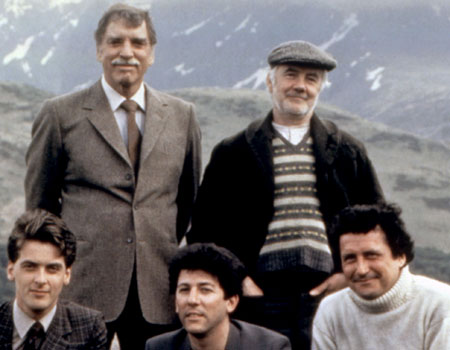 In recent years its environmental credentials have crystallised into what now looks like a timely sermon about our over-reliance on oil. Knox Oil mogul Felix Happer (Burt Lancaster) choppers in like a deus ex machina to close the deal, only to come up against old Ben, the wise man of the beach who persuades him to switch from oil to astronomy. (Pictured right, Lancaster standing on set with Fulton Mackay; in front from left, Peter Capaldi, Peter Riegert and Christopher Rozycki.)
In recent years its environmental credentials have crystallised into what now looks like a timely sermon about our over-reliance on oil. Knox Oil mogul Felix Happer (Burt Lancaster) choppers in like a deus ex machina to close the deal, only to come up against old Ben, the wise man of the beach who persuades him to switch from oil to astronomy. (Pictured right, Lancaster standing on set with Fulton Mackay; in front from left, Peter Capaldi, Peter Riegert and Christopher Rozycki.)
It was in Gregory’s Girl, his no-budget comedy about teenage angst, that Forsyth first paraded a taste for off-beat whimsy. (Previously he had made his living in documentaries.) In Local Hero he quietly folded that quirky voice into a capacious narrative about sea and sky (hence the two main female characters named Marina and Stella) but also the tectonic plates of the Cold War. By night the northern lights twinkle benignly in the heavens which by day swarm with NATO test-jets, while the ancient waters yield lobsters, embargoed South African oranges and a hearty trawlerman from Murmansk, who boats in to sing at the ceilídh and check on his investment portfolio. This colourful character was no fanciful invention. Ditto the plot’s other fish out of water, the parish’s West African vicar.
Local Hero’s success brought Forsyth the chance to make three movies in America. He returned disillusioned and, aside from a short in 2009 titled Bill Forsyth's Lifetime Achievement Film, hasn't shot a frame since Gregory’s Two Girls in 1999. But along with Peter Riegert and Denis Lawson, the film’s two male leads, he reminisced with theartsdesk.
Watch the US trailer to Local Hero
BILL FORSYTH
Could you shed some light on the plot’s genesis? In the DVD extras you talk about how Orkney had done a deal with an oil company similar to the one you portray in the film.
It was quite key to the inspiration. It was the chief executive of the Orkney council who negotiated a really really great deal for the whole community when they were developing the oil terminal. It wasn’t just one company. They were negotiating for this oil terminal which they were all going to use and so he realised that he had quite a strong position and he just did incredible things which hadn’t been done before. Got the community a cut of the revenue and social things like take care of libraries and community centres. It was the scenario where a small community made the best use of the power that it had.
There were examples of small communities which had become en masse wealthy. Pig farmers would be driving about in Jensens
The film skirts over the negotiating situation because that was one thing I didn’t know anything about and didn’t care to research too much. I remember thinking, what they hell can they say to each other? But I had spent the previous 10 years making documentaries all over Scotland so had a fairly good feel for the Highlands and Scottish communities and the economic mechanisms that were at work. I was actually pooling a lot of information. One thing we were always trying to counter in these films was that if you weren’t city-based then you were slightly inferior. That wasn’t the reality. Most of the people you encounter from the Highlands – there were a lot of people who worked at sea and you would find people from the outer islands who were broadly travelled and very sophisticated. It was to counter all of that. That’s what Gordon’s character was all about.
How much did you know about Houston before you started writing?
All I knew about Houston was how to pronounce it. I didn’t know anything about the city and how it functioned. I suppose it was in the news in those days. Because of the oil boom and oil companies were coming to Scotland and were in the headlines, I vaguely knew that was one of the bases of the American oil industry. I didn’t research it. I’m not very good at research. I remember somebody once said if you’re making a fictional film about any particular aspect like a business or a way of life all you need is two real facts. You can make up the rest. As much as anyone else I had a vague idea of what an oil executive would be and how he would function. Macintyre is an everyman executive. It’s the idea of people losing their personalities in the glass tower of work. At that time they were in the air - all these questions about how are we conducting our lives: are we losing a sense of ourselves?
So how did you embark on solidifying that idea into a commissioned film?
The deal came before the plot. David Puttnam came to me and said, “I don’t know what you’re doing next but if you can find an idea in Scotland that would involve one or two American characters so we could have a couple of Yanks in it then I could finance it.” Warner had a pick-up deal for anything he was making. I went away and because of the fact that I knew Scotland well and about the oil business I came back with that idea fairly quickly. It was a no-brainer having American oil men in Scotland. I had to write a two- or three-page treatment. I invoked the Beverly Hillbillies. This is boomtown Scotland. At that time there were examples of small communities which had become en masse wealthy. Pig farmers would be driving about in Jensens. I remember a joke at the time. This farmer has got a brand new Rolls Royce and phones up and says, “I can’t get any more than 40 mph out of this.” “What gear are you in?” “I’m just in my dungarees and Wellingtons.”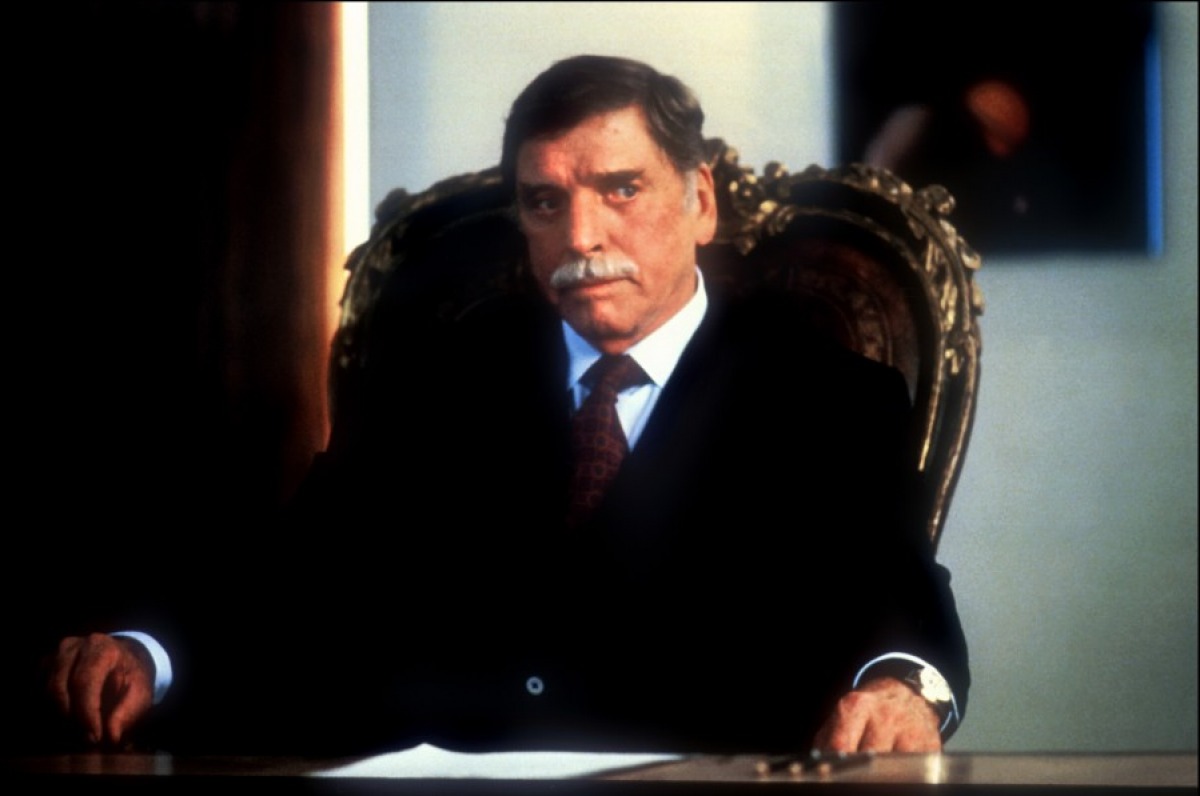 How about casting? It was quite a coup to get Burt Lancaster.
How about casting? It was quite a coup to get Burt Lancaster.
Lancaster was there from the very beginning in my head. I began to write the script for him. There was no one else on the horizon as far as I was concerned. I don’t think I even thought we would get Lancaster. It’s always nice to have someone in mind so you can find a voice for him. It was round about the time of Atlantic City. In those days Hollywood stars really were stars. They were beyond human. I remember in Atlantic City he seemed to be playing a human being. I had read something in an interview he had done around that time. Someone said, “You’ve been acting for 30 or 40 years. Have you any ambitions left?” “I’d like to do some real comedy.”
What are your memories of working with him?
He was quite a lot of fun. He was no trouble at all. There was no ego. He didn’t need an ego because everyone respected him. That was just normal. He was hard-working. Like me he didn’t have a lot of small talk, which suited me fine.
Were any of those Ealing comedies in the back of your mind as you wrote?
I caught up with the films after I made it and people started to invoke Ealing comedies vis à vis my work. It was only then that I went to them to see what they were talking about. I wasn’t trying to emulate them. I was fairly dismissive of them before I had seen them, as you do with any British films. Puttnam had this trick and would phone me up and say go to the [he names a Scottish cinema].” I’m sure he organised the screening of Whisky Galore and It’s a Wonderful Life. I think that was his way of trying to cut off my bleakness at the pass. I’d written a draft and so maybe he was feeling it then. It’s not bleakness. It’s just a sense of realness. How else can you apprehend the world without a sense of realism about it? It’s not an emotional response to the way the world is. It’s an intellectual one and a clear-eyed one.
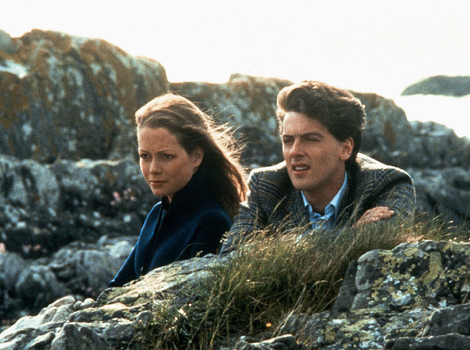 To me and I’m sure to all fans of the film, the casting seems utterly perfect. Did you get your first choice in every case? (Pictured, Jenny Seagrove and Peter Capaldi)
To me and I’m sure to all fans of the film, the casting seems utterly perfect. Did you get your first choice in every case? (Pictured, Jenny Seagrove and Peter Capaldi)
I’m pretty sure I did get my way. I had very good casting help from Suzy Figgis. She was at the spearhead. She was into a lot of fringe theatre in London and knew everyone who was there. Denis was the first choice. For David’s sake he had to show audition reels to the financiers and the studio also I had to go through this process of setting up scenes with actors and filming them more or less to prove that some casting process had taken place. It was a tough tough thing to find Peter. I spent weeks in New York and LA meeting every single actor between 20 and 35 that you could think of. Who did I not meet? One of the people after the part was Michael Douglas. As soon as a film is getting close to production the script just goes all over town. Suddenly we got a call that Michael has read the script and wanted to talk about it. Maybe it’s vanity on my part in those days but I didn’t want any more names in the film. I think at this point I had already committed to Peter. Once again because the finance was involved I had to go through the motions of meeting him and talking to him. That was quite funny too. I was staying at the Holiday Inn in Beverly Hills. I heard the secretary at the office say, “Michael doesn’t eat at the Holiday Inn.” We ended up at the bar at the Beverly Wilshire. I was travelling to New York the day after and checked into my hotel and Michel Douglas walked in. I thought, he’s really after this part. We spent another couple of hours together. It was more just a matter of sitting it out. There wasn’t a huge amount of pressure. It was only a two or three million dollar picture and David carried a lot of authority with the financiers. I do remember a particular point when they were taking a little while to commit to Peter and I said to Peter, “If you don’t do the picture I won’t.” It was genuinely how I felt. I didn’t really know what I was saying. I wasn’t saying it in a political sense.
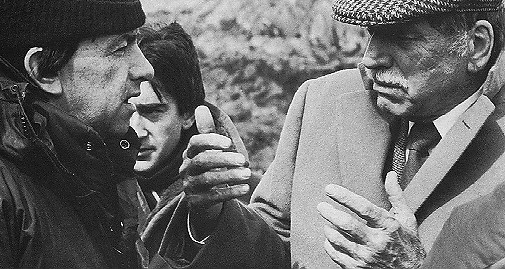 How was the shoot for you once you assembled this cast? (Pictured, Forsyth on set with Burt Lancaster)
How was the shoot for you once you assembled this cast? (Pictured, Forsyth on set with Burt Lancaster)
It’s true of any film that when you’re writing a script the script becomes limitless in its possibilities but when you’re filming it you’re killing it. We had a good spring. But I wasn’t joining in the fun. It was my first serious film beyond the two that I had made with friends locally. The thing that was catching up with me was that as a writer-director you are the focal point of all the work that goes on. At the end of every single day I would have to go back - I wouldn’t go to the pub - and think about what we’d got, rewrite the scene for tomorrow. It was just continual work. Iain [Smith, associated producer] said, “It’s looking really good but there’s no conflict in it.” I said, “I’m not going to put any conflict in it.” But I remember thinking, he’s right. All these people are just saying things and walking in and out of situations. It was almost for the audience’s sake that something physical had to happen so it was after that that I wrote the scenes where some of the villagers came onto the beach and introduced an element of threat.
The film’s environmental message may be what people take out of it more than they used to be, but back in 1983 it was more overtly a film set during the last days of the Cold War. Your Russian capitalist with marital issues is a wonderful creation. I’d love to hear how that idea came to you. Were you very determined that a comedy about a Scottish fishing village would confront the great political issue of the day and ask for a little peace and understanding?
Because I was writing for Scotland and it was one of these countries that felt slightly inferior, I wanted to up the ante for it. I suppose a very very basic motivation was to let people feel that Scotland had a cosmopolitan aspect to it. That was based in reality. It did happen. There were Russian trawler fleets that operated in the North Sea and the North Atlantic. The Russians used to have factory ships which anchored just off Ullapool. There were times where you would see almost a whole fleet anchored off Ullapool and these guys would come ashore and go to a pub. Apparently they were always quite dour and didn’t talk. At that time in the thick of the Cold War - it was something quite interesting.
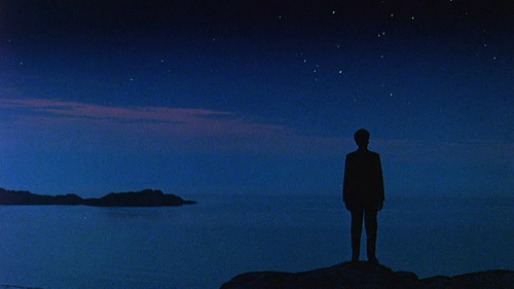 How much did you know about the sky before you wrote it?
How much did you know about the sky before you wrote it?
I was a very keen amateur astronomer when I was young and to some extent still am. It wasn’t something I had to think about. I knew what it was all about. When I was writing the script I was also working on a George Mackay Brown ghost story and when filming that was the first time I’d seen the northern lights and that’s why it ended up in the film. The northern lights were created and not too well because special effects in those days weren’t too hot. It used to worry me. There’s a tiny bit of northern lights on the telephone box. They had to mask all the bits where it wasn’t supposed to be.
It’s interesting that Gordon and Stella are at it like rabbits (and Gordon also cooks a tasty rabbit stew) but have no children. Was that strategic?
That hadn’t crossed my mind. We mostly concentrate on Gordon and Stella and they’re pre-children. If kids had been in my horizon at the time they might have ended up in the script.
Overleaf: 'You really want to send them out with a song in their heart - Mark Knopfler's soundtrack
Listen to the acoustic theme tune to Local Hero
How much time did you spend working with Mark Knopfler and to what extent did you tell him exactly what you wanted?
Mark was in from quite early on. It was something David Puttnam had done. At a very early stage months before we shot he had set up this meeting and deal with Mark’s manager that Mark would do the music. I was involved in that. We met and talked about it. He was in there at a much earlier stage than a musician would normally be. It was because of the céilidh. He was involved in writing an arranging that. He was on set for the whole of that. He was involved in quite interesting ways that a composer would not normally be. It gave him a deep deep feeling for the thing. Also he grew up in Glasgow so he knew the sensibility quite well. He’s a very smart man so he connected with the ideas. Normally he would end up watching a rough cut months after the shoot.
I was becoming aware that this is how you get people in to watch movies
I must confess that Mark’s music did one other thing. In a real way it made the film if not saved it - because I’m so reluctant to give things to an audience. Maybe I err on the side of reserve. His music opened it up. He saw what the film wanted to do and his music helped it by another 50 percent to do that. I do remember in the very early days we had one or two screenings and the film was very different. I have a sense of failure that a film needs music finally. It’s helping the film do what it should do anyway. I know it’s part of the box of goodies that you use. I felt, wow, thank goodness. The film has been saved. I could hear the box office going up. It meant all of that.
How about the famous theme tune, which crops up throughout the film?
What normally happens if you sit down with the composer and talk about where music would work. The composer would take notes and then that’s where the themes would come from. From what I remember it seemed to be around the beach scene that that first came into the equation. It made me feel that something better was happening than without the music. The funny thing was when it goes all electric, once again that was Puttnam’s thing. He said, “You really want to bring the audience to their feet and send them out with a song in their heart.” He more or less instructed Mark: “Give us a big lift at the end.” And Mark did deliver. At that point I was becoming aware that this is how you get people in to watch movies.
I’d like to ask you about that bleak ending. How hard did you have to fight off those who wanted to change it and have him stay on in the village?
Warners had said, “We are happy to release the film but we are also happy to finance a reshoot of the ending.” It wasn’t so much that we were fighting off an attack on the movie. We were more or less politely declining some help. It was very early days for me in Hollywood but I thought, that’s such a typical studio response. It’s as if the other half of the movie doesn’t mean anything. It seems so banal. They wanted Mac to change his mind.
There was almost a slight irritation that a non-American was having the gall to hint these things about the American way of life. One guy at the preview in Seattle got me more or less against the wall and said, “You don’t have the right to play around with the American hero in this way. It’s not something you muck around with.” The same thing in the studio. Here was this little upstart in Europe was having the gall to hint these things about the American way of life. Macintyre was an everyman losing his personality in the glass tower of work.
The film has had a charmed afterlife. Thirty years later it lives on in the memory of many fans who understand what a masterpiece it is.
I reluctantly acknowledge it under these circumstances. Whenever you make a film you really have to let it go. I think it’s kind of a posture, maybe a defensive posture I adopted to all the things that I did. I can’t quite believe in it because I don’t really know what it amounts to …….. that’s the thing with me. To me it’s a film of its time and that’s it.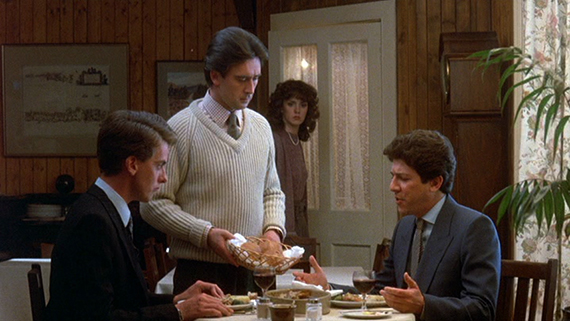
DENIS LAWSON
Was Local Hero as much fun to shoot as it is to watch?
Doing Local Hero was for me the most enjoyable experience I’ve ever had actually. It was a combination of events. Everyone had a wonderful time – the crew, the actors. David Puttnam kept wandering around the set saying, “I don’t have a job to do.” And we were lucky with the weather. The weather was glorious. With the west coast of Scotland that takes a bit of doing. Only after when I sat down with Bill a few years later did I find out that he hated it. Because actually he just doesn’t like shooting. It was such a beautiful script. Preparing it I’d be working on these scenes and then we’d shoot the scene. For instance the rabbit casserole scene. You’d think, this scene is going to be such a blast, and then it was fantastic to do and then you wrap and you’d go, oh, I’ll not do that scene again. I’d like to do that scene again. The same applied to Bill. He said to me, “I feel like I’m killing off the scenes as I go along.”
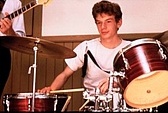 It would explain why he came back to Gregory’s Girl. (Pictured, John Gordon Sinclair's cameo in Local Hero.)
It would explain why he came back to Gregory’s Girl. (Pictured, John Gordon Sinclair's cameo in Local Hero.)
He always had a sound man called Louis Cramer who is Glasgow-based and worked on all of his films. At any given point in a movie he would turn to Louis and say, “Honestly I don’t know why I’m doing this.” And Louis would go, “Now come on, the film’s going to be great, come on, you know this is going to be good.” And in Gregory’s Two Girls he turned to Louis and said, “Christ, Louis, I shouldn’t be doing this.” And Louis, “Yeah, Bill, I think it’s time you should stop.” Directing can be a very stressful experience. And maybe he’s just too sensitive to deal with it.
Gordon says, “We tend to double up around here.” Was he multi-faceted on the page?
Not when I first read it. The feelings about how I played it developed as I worked on the script. But I certainly saw very clearly what was very exciting was to play at that time a contemporary Scottish character who was by no means a cliché. Around that time it was quite hard to find a Scottish character who wasn’t wellies and a kilt or a Gorbals heavy. Bill doesn’t write that kind of material. So it was a great relief to play. The Scottishness of that character wasn’t larded on with a trowel. He was a bit of smart cookie.
He would have voted Thatcher.
You know I hadn’t ever thought of that. Maybe he would have done. He was playing the market. Oh God, what a horrible thought. That’s really appalling. The relief from my own perspective of playing that character was enormous. How long had I been working at that point? Just under 10 years. And I hardly ever used my own voice. And so because nobody wanted a regional voice in the business I was always asked, “What is that? Are you Irish? Can you lose that?” Always. The relief of being able to sound the way I sound – I’d almost forgotten what I did sound like – was huge. After that I felt this is what I sound like and this is what I’m going to sound like unless it’s absolutely essential to sound like something else.
Who would ever have thought of that wonderful running gag? A man who is always having sex with his wife
Did you have a sense that Bill Forsyth was attempting to bang the drum for the Scottish voice?
I’ll tell you something he did say to me. Up until that point, not just within our profession you got out - you left Scotland to make it. And particularly in the business. He said to me, “A lot of us decided to stay.” That was quite a big statement. “And make something and be confident of being Scottish.”
Was it Scottish humour or Forsyth humour?
I’d have to say that it is one and the same. His humour is quite laced with irony and the Scots have a very ironic, dry, throwaway sense of humour. Bill has that. Bill himself has a huge charm as a man and that charm is laced through his work.
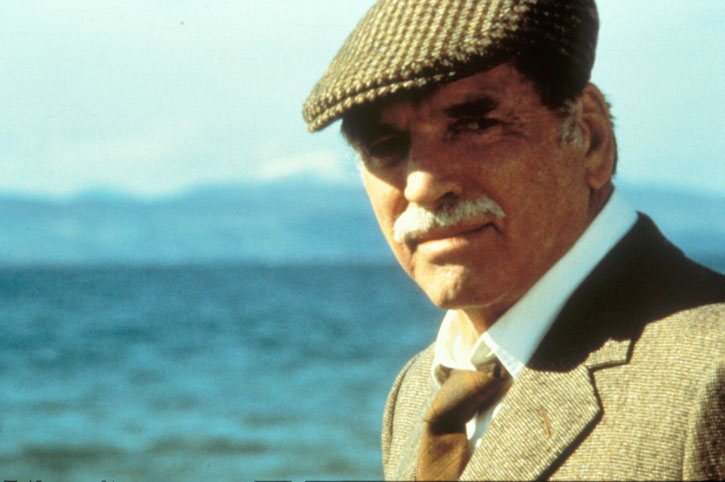 Was there a sense of excitement that you were working with a copper-bottomed golden-era Hollywood superstar?
Was there a sense of excitement that you were working with a copper-bottomed golden-era Hollywood superstar?
Oh God yes. Huge. I think they could only afford him for three weeks when he came to Scotland. Having read subsequently a wonderful biography of him I realise what a dangerous character he could be. His temper was legendary. A frightening man, basically. He was fantastically nice. I think he was quoted as saying it was his happiest shoot that he’d ever been on. I remember sitting with him on the beach and asking him about stuff. I knew that he had worked in the circus when he started. He was a tumbler. I was asking him about that because I had done a lot of physical work myself. And then trying to demonstrate a back flip on the beach. It was a long way to the beach and we used to congregate in this bar on the way back and I remember somebody thinking, well maybe we should call Burt, maybe he’d like to come for a drink. And of course he did. I remember him standing at the bar with a whisky and sidling up and just standing beside him just bathing in the afterglow. He was a terrific guy.
Did you have time to rehearse?
First of all it was lucky that Peter Riegert and I had a mutual friend in London, a writer called Howard Schumann. Peter had done a play of Howard’s in New York and I had done the same play in London. Censored Scenes from King Kong, it was called. There was that connection. When Peter came to London to do couple of days’ rehearsal I therefore had Peter over to my house and we bedded in a bit over a five-day period. I don’t remember meeting Capaldi till we got up there. He had only done stand-up comedy for rock bands before then.
You had a consensus that you were working on something special?
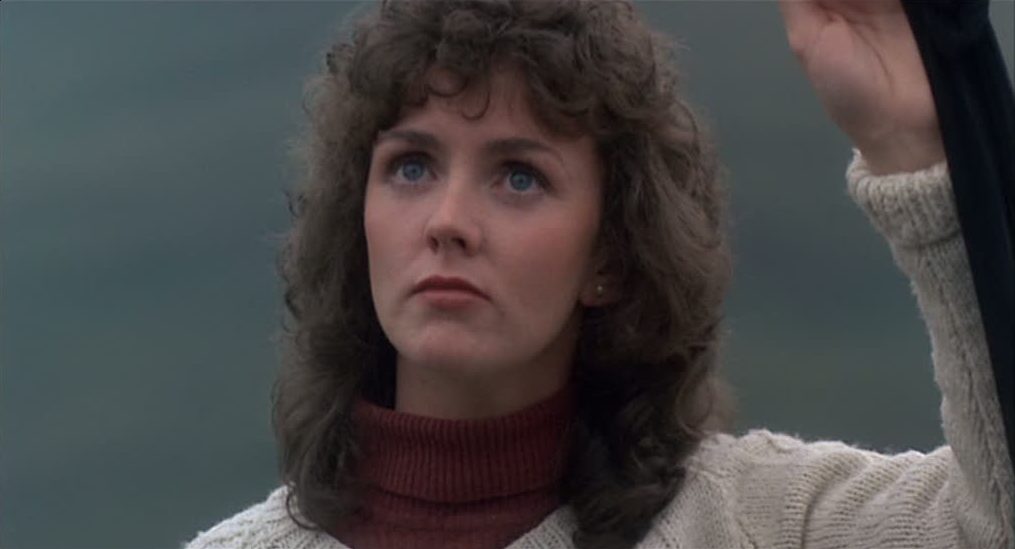 You don’t know. You just have no idea. You know you’re having a good time but you’ve no idea. It was my first major role in a movie and when I saw the first screening I rang my agent and said, “I’ve blown this, I don’t think my performance is any good, I’ve not done enough.” I really underplayed him. I feel fine about it now. Another thing Bill did with myself and Jennifer Black (pictured) - I was the first actor on the movie that he cast and he included me in the screen testing of the actresses to play my wife. After a test in typical Bill fashion he’d go, “What do you think?” We cast it together which was a very smart thing to do because I ended up with an actress who I had a little chemistry with. Who would ever have thought of that wonderful running gag? A man who is always having sex with his wife.
You don’t know. You just have no idea. You know you’re having a good time but you’ve no idea. It was my first major role in a movie and when I saw the first screening I rang my agent and said, “I’ve blown this, I don’t think my performance is any good, I’ve not done enough.” I really underplayed him. I feel fine about it now. Another thing Bill did with myself and Jennifer Black (pictured) - I was the first actor on the movie that he cast and he included me in the screen testing of the actresses to play my wife. After a test in typical Bill fashion he’d go, “What do you think?” We cast it together which was a very smart thing to do because I ended up with an actress who I had a little chemistry with. Who would ever have thought of that wonderful running gag? A man who is always having sex with his wife.
How popular were you in your two locations?
I think we did pretty good. The locals were very welcoming. What I remember particularly was Pennan itself. Their life was absolutely disrupted but they seemed to adore it. I remember a couple of local women. There’s a little bridge where we shot a night scene and we were standing there and this woman said, “I’ll always remember this night.” Quite often when a film unit leaves a place like that there’s a sense of anticlimax and depression because the glamour has gone, the buzz is gone, and I’m sure they would have felt that. But they were great.
And yet they have been having visitors ever since.
Oh God yeah. I’ve been back once. I drove in just to have a little look around. There was a couple who had driven in behind us to see the phone box and they couldn’t quite believe that I was standing there.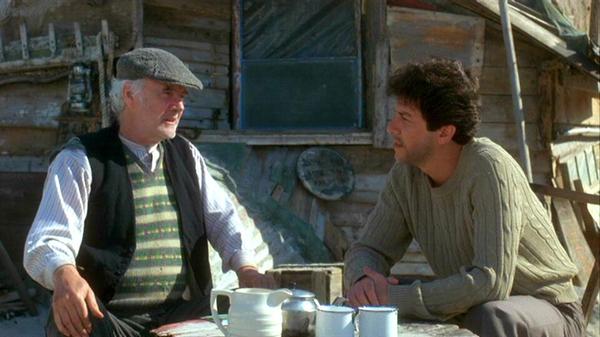 PETER RIEGER
PETER RIEGER
Could you cast your mind back to when the script landed on your lap?
My memory is that I had gotten the script on a Monday. I was out late and got home at about 5.30 in the morning of Tuesday and I read to help me go to sleep and the next thing I knew it was a couple of hours later and I certainly knew I had read something special. Of course, who do you call at 7.30 in the morning?
If you could storyboard the best possible experience for an actor, this would be it
They told me that the director would be in New York City on Thursday and they set up a meeting. They mentioned David Puttnam. There was some talk of Burt Lancaster. That wasn’t sure yet. My only question was how well could the director direct this movie? After I met Bill I saw Gregory’s Girl and that pretty much convinced me there wouldn’t be any problem. I met Bill on Thursday at a bar on Central Park West and 62nd Street. The hotel isn’t even there anymore. And we chatted and I kept him out as late as I could trying to keep my face as the last one he could remember. They said to my agent that Bill was really interested in me but because of studio politics it was going to take a couple of months. I got a call from Puttnam’s office telling me he wanted to meet me at the Carlyle Hotel in New York and I got a call from Bill saying he was going to be there. At that meeting was Mark Knopfler and after about an hour he excused himself and before he left he looked at me and said, “I’ll see you in Scotland and I’ll think you’ll be terrific.” So he was kind of telling me I had the part but the people who I wanted to tell me I had the job hadn’t told me yet. Bill walked me downstairs and said to me, “I didn’t know you didn’t know.” I said, “Well nobody’s told me I had the movie.” He said, “I’m telling you.” He said, “I wrote it and I’m going to direct it and if you’re not in the movie there’s no movie.” That’s about a rare a thing as anybody could say, especially when there are large sums of money involved.
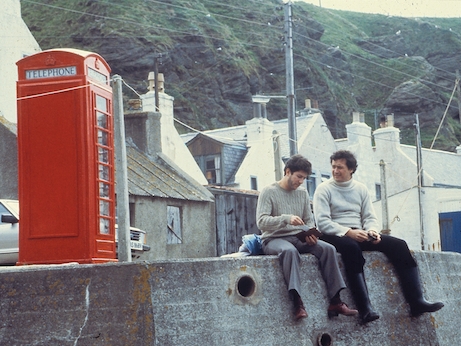 Was a film lead a step up for you, even if it was a small Scottish comedy?
Was a film lead a step up for you, even if it was a small Scottish comedy?
I never think of anything as other than how good the material is because you never know what’s going to succeed. But I also knew that anybody in my group wanted that movie. Everybody around my age was angling to play Macintyre. I was young enough to not be thinking about it obsessively. As you’re starting out there are so many landmarks that seem important, so it wasn’t shocking. I wasn’t shaking with fear. But yes, in retrospect it was probably one of the bigger challenges, especially the way the film was done stylistically.
Could you elaborate on that?
There is nothing an actor likes to do more than act too much. Lots of screaming and yelling. You want to act, you want to show off. What I loved about Local Hero was I was going to be doing less and less in hopes of achieving more and more. Bill was eloquent in his use of very simple underplayed emotion which left a big impact.
How did you and Denis Lawson bond?
I was lucky because we did meet a little bit but when we were all together making the movie we all lived together in a road house on the road to the isles between Fort William and Arisaig where the beach was. There is a natural bonding anyway when a group is working on a film but we got to see each other all the time and Denis and I had an immediate affinity for one another. We had a very similar sense of humour. It was just one of those happy accidents. As much as Denis and I could communicate through our kibitzing with one another, Bill and I did the same thing but almost silently because he is a very shy, withdrawn person. If you could storyboard or write out the best possible experience for an actor, this would be it. It was effortless. I didn’t even have to do anything, to be honest with you. I mean it takes some talent to do that but it was a glorious experience because I knew what Bill was asking and I was ready for it. It’s a good example of the actor meeting the part, I guess.
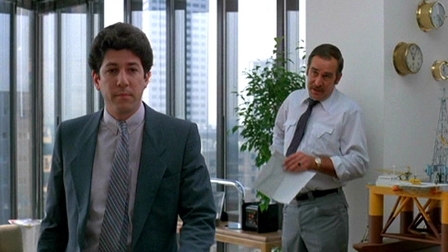 Did you get where Mac was coming from? He’s got this job in Houston, he’s got no life, a stack of ex-girlfriends who don’t want to see him and communicates with people in his office via telephone through the glass partition.
Did you get where Mac was coming from? He’s got this job in Houston, he’s got no life, a stack of ex-girlfriends who don’t want to see him and communicates with people in his office via telephone through the glass partition.
I connected to the material. It just resonated with me. I didn’t spend a lot of time creating a character because I tend to work off the creation of the character by the writer and then let the director have the control of the nuance of the character and all I offer up is my emotional impressions. But I didn’t want to complicate the experience. I wanted the character to have the experience.
Presumably it was perfectly set up in a way because you were an American actor going into an enchanting environment to be won over by it, and so less hunting for the character’s motivation was required.
I’m the audience in the movie in a funny kind of way. So I have to look at the exotic landscape and the exotic population with the open eyes of somebody who has travelled for the first time. The end of the movie when I come back to Houston was shot on the second day we were working so since we hadn’t made the movie and I didn’t know what my emotional experience was going to be as an actor I had to disinvest my imagination so the audience could invest their imagination onto me. That’s what makes to me the execution of the movie so interesting. Bill understood that. For those who like the movie I think it gets in their head, and that’s the hardest thing of all to accomplish.
I was more than happy to be in awe of Burt Lancaster
Can you remember meeting Burt Lancaster?
We were in Houston and I was standing in what was going to be his office and we had just shot the scene where I climb up those celestial stairs. I walked off to the side and looked down to Bill and there was Lancaster and that’s how we got introduced. Our first television we got when I was five years old - so that’s 1952 - one of my first memories is of an actor doing an impression of Burt Lancaster and Kirk Douglas arguing with each other. Then I had seen his movies so he was an icon to me, which was perfect for the story: Mac had to be awe of Happer. And I was more than happy to be in awe of Burt Lancaster. He was just generous and good-natured. He was also having a good time too. When he was done after three weeks Puttnam gave him a party at a hotel along Loch Ness and Lancaster made a speech in which he talked about hard it is to find material and how special this piece was and how proud he was to have been asked to participate. I don’t know if it was his favourite but by that time he had starred in 85 movies.
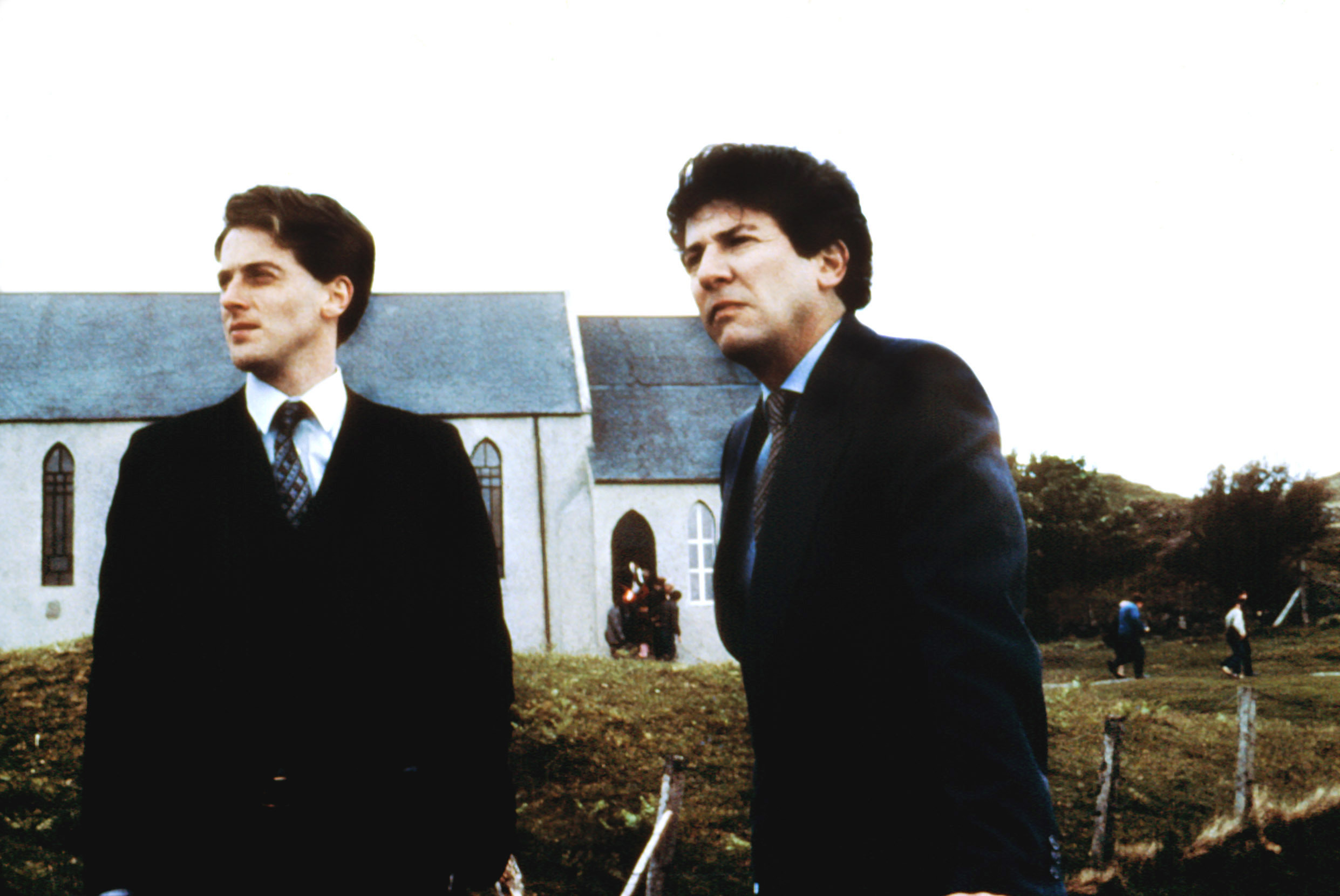 It was Peter Capaldi’s first acting job. How did he strike you as Macintyre's gangly local gofer Olsen?
It was Peter Capaldi’s first acting job. How did he strike you as Macintyre's gangly local gofer Olsen?
I trust my directors. Whoever they hire, if they tell me that’s the guy then that’s the guy. I was flown to London to do a reading about three or four weeks before we started shooting in May. Denis was there, Fulton Mackay, Peter, the two Jennys. Afterwards Bill said to me, “What do you think of Peter? He’s never acted before. Are you worried at all?” I told Bill, “Don’t give him an acting lesson, leave him alone. He’s going to be fantastic. He’s got his own demented quality and you chose him for a reason. Just trust it. He’s going to be fine.” And he was. It’s an example of matching a quality that an actor has with a quality that a character needs. If you can match those two up then you have what you call chemistry. Peter was an exuberant enthusiast and so was his character.
Can you recall Bill Forsyth’s demeanour during the shoot?
Bill has a devilish sense of humour. He’s very open, extremely curious, and very courageous. What more can one ask for? When I met him I just fell in love with the guy. I was in heaven, literally. Here I am in the Highlands of Scotland, working with all this incredible talent, having the time of my life. So I was blind to anybody else’s problems. The character of Macintyre doesn’t really understand the troubles of the people of the town. In his eyes he sentimentalises this place. But that’s the joke of the movie. They don’t. They can’t wait to sell their place.
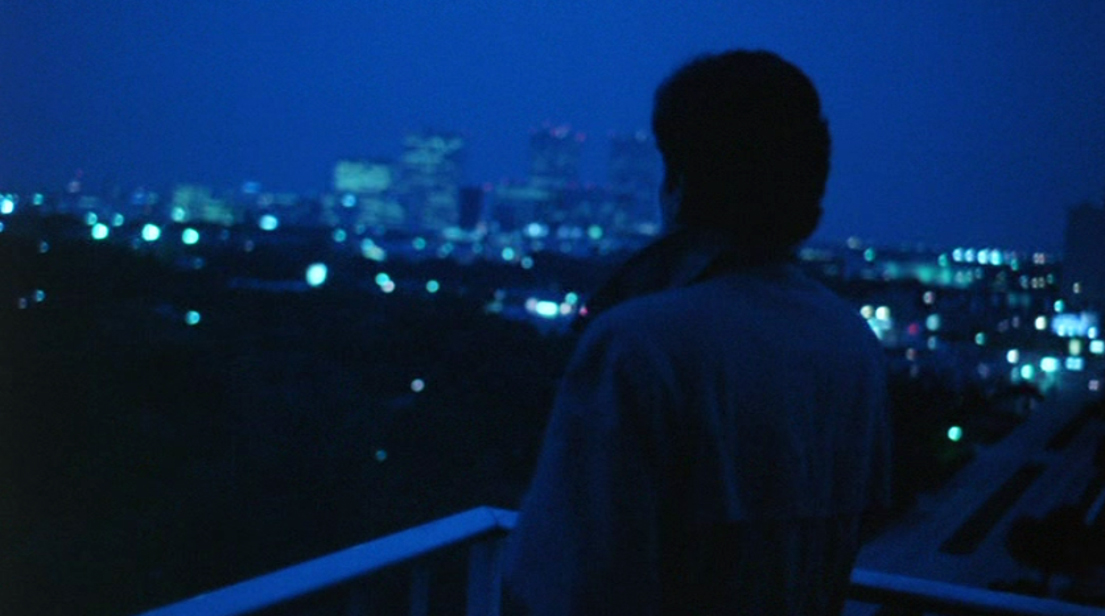 Do you take the view that it’s a tragedy?
Do you take the view that it’s a tragedy?
I think the tragedy is untold by the end of the movie because he still has a chance but Bill doesn’t tell us what’s going to happen. The tragedy would be if he did nothing with his experience. The movie is largely about connection. And the symbol of connection is the telephone. And of course there is nothing worse than reaching out to somebody or some place and not get that echo back to you. That kind of bitter-sweet feeling resonates immensely in a lot of people. But when you set out to tell the story you never know that that’s going to be your result. Adding the phone scene at the end is an example of how the creative process works. You make stuff up with what you’ve got, whether it’s your idea or somebody else’s idea. Somebody else’s bad idea can sometimes turn into what seems to be your own brilliant idea.
What were your feelings at the end?
It was very powerful. It was very moving. I guess in a way I was going to take that experience with me the way Macintyre took his experience with him. I don’t want to oversell the correlation. But if it means anything that’s what it meant, to the point where I can recall pretty much in detail what I experienced. I’ve had a lot of affection about the film from people and it’s always nice to be involved in something that’s going to last longer than you will.
Mark Knopfler performs the theme from Local Hero live in 1983
Explore topics
Share this article
The future of Arts Journalism
You can stop theartsdesk.com closing!
We urgently need financing to survive. Our fundraising drive has thus far raised £49,000 but we need to reach £100,000 or we will be forced to close. Please contribute here: https://gofund.me/c3f6033d
And if you can forward this information to anyone who might assist, we’d be grateful.

Subscribe to theartsdesk.com
Thank you for continuing to read our work on theartsdesk.com. For unlimited access to every article in its entirety, including our archive of more than 15,000 pieces, we're asking for £5 per month or £40 per year. We feel it's a very good deal, and hope you do too.
To take a subscription now simply click here.
And if you're looking for that extra gift for a friend or family member, why not treat them to a theartsdesk.com gift subscription?
more Film
 Blu-Ray: The Man in the White Suit
Ealing Studios' prescient black comedy, as sharp as ever
Blu-Ray: The Man in the White Suit
Ealing Studios' prescient black comedy, as sharp as ever
 The Woman in Cabin 10 review - Scandi noir meets Agatha Christie on a superyacht
Reason goes overboard on a seagoing mystery thriller
The Woman in Cabin 10 review - Scandi noir meets Agatha Christie on a superyacht
Reason goes overboard on a seagoing mystery thriller
 London Film Festival 2025 - crime, punishment, pop stars and shrinks
Daniel Craig investigates, Jodie Foster speaks French and Colin Farrell has a gambling habit
London Film Festival 2025 - crime, punishment, pop stars and shrinks
Daniel Craig investigates, Jodie Foster speaks French and Colin Farrell has a gambling habit
 I Swear review - taking stock of Tourette's
A sharp and moving tale of cuss-words and tics
I Swear review - taking stock of Tourette's
A sharp and moving tale of cuss-words and tics
 A House of Dynamite review - the final countdown
Kathryn Bigelow's cautionary tale sets the nuclear clock ticking again
A House of Dynamite review - the final countdown
Kathryn Bigelow's cautionary tale sets the nuclear clock ticking again
 theartsdesk Q&A: Idris Elba on playing a US President faced with a missile crisis in 'A House of Dynamite'
The star talks about Presidential decision-making when millions of lives are imperilled
theartsdesk Q&A: Idris Elba on playing a US President faced with a missile crisis in 'A House of Dynamite'
The star talks about Presidential decision-making when millions of lives are imperilled
 Urchin review - superb homeless drama
Frank Dillane gives a star-making turn in Harris Dickinson’s impressive directorial debut
Urchin review - superb homeless drama
Frank Dillane gives a star-making turn in Harris Dickinson’s impressive directorial debut
 Mr Blake at Your Service review - John Malkovich in unlikely role as an English butler
Weird comedy directed by novelist Gilles Legardinier
Mr Blake at Your Service review - John Malkovich in unlikely role as an English butler
Weird comedy directed by novelist Gilles Legardinier
 Don't Let's Go to the Dogs Tonight review - vivid adaptation of a memoir about a Rhodesian childhood
Embeth Davidtz delivers an impressive directing debut and an exceptional child star
Don't Let's Go to the Dogs Tonight review - vivid adaptation of a memoir about a Rhodesian childhood
Embeth Davidtz delivers an impressive directing debut and an exceptional child star
 One Battle After Another review - Paul Thomas Anderson satirises America's culture wars
Leonardo DiCaprio, Teyana Taylor, and Sean Penn star in a rollercoasting political thriller
One Battle After Another review - Paul Thomas Anderson satirises America's culture wars
Leonardo DiCaprio, Teyana Taylor, and Sean Penn star in a rollercoasting political thriller
 Steve review - educator in crisis
Cillian Murphy excels as a troubled headmaster working with delinquent boys
Steve review - educator in crisis
Cillian Murphy excels as a troubled headmaster working with delinquent boys

Add comment